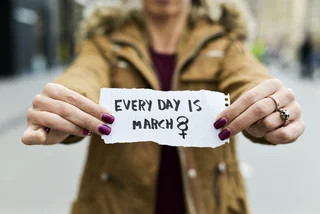The Czech government rolled out its new tax package earlier this month and with it, new VAT rates for certain consumer goods. Sugary drinks, alcohol, and cigarettes were hit with higher taxes while food and non-alcoholic beverages moved to a lower tax category. Books went into the zero-tax category.
Among the products that won't be getting any cheaper are feminine hygiene products, taxed in Czechia at a rate of 21 percent, among the highest in the EU.
PARTNER ARTICLE
The SOLA Pomáhá initiative, which provides period supplies to women in need, has spoken out against the new tax package for its failure to lower the so-called tampon tax.
"Maybe somehow we naively thought that maybe... Well, no. Something that half the population needs every month is gonna get taxed pretty heavily. But books are 0% now, so maybe 4-5 pages for weaker periods and 8-10 for stronger ones?" the group wrote on Instagram.
The issue has been under debate in Czechia for some time. In 2016, activists petitioned the government to introduce zero tax on tampons and maxi pads.
At the time, however, the Ministry of Finance rejected discussions about lowering VAT, saying that exceptions to the basic rules of the VAT system should only be made minimally and in justified cases and that the tax cut will not necessarily make products cheaper. The department restated the same opinion in 2019.
What is period poverty? Period poverty is defined by the World Health Organization as “inadequate access to menstrual hygiene tools and education, including but not limited to sanitary products, washing facilities, and waste management." The term also refers to the increased economic vulnerability women and girls face due to the financial burden posed by menstrual supplies.
In 2020, as other countries began lowering the tampon tax or giving menstrual supplies away for free, then Prime Minister Andrej Babiš announced that he would ask Finance Minister Alena Schillerová to explore the options for Czechia as well.
But the plan to reduce VAT on pads and tampons failed to materialize once again.
In 2022, the debate was reignited by Pirate Party MP Klára Kocmanová who vowed her party would take steps to combat menstrual poverty in the Czech Republic by providing free menstrual aids for everyone.
Pirate Party MP Klára KocmanováThe VAT rate of 21 percent levied on menstrual products in the Czech Republic is higher than diapers for which the tax rate has been previously reduced.
Bolstering of food bank supplies not enough
Currently, the state is distributing menstrual products to women in low-income households from its State Administration of Material Reserves through food banks. But some lawmakers including Kocmanová as well as charitable groups like SOLA Pomáhá say it's still not enough.
Lu Gregorová from Sola Pomáhá, told iDnes that data on women in material need and poverty should guide Czechia's decision to eliminate the tampon tax.
"Then we could be talking about approximately 11 percent of women. But I think this number will be very far from reality and will, unfortunately, be much higher," she added.
Kocmanová told the publication that she is pushing for the provision of menstrual supplies in schools, where some female students miss classes and stay at home because the can't afford them. She said a pilot project with Pirate governor Rudolf Špoták from Plzeň, aims to hand out free period products in the region.
Kocmanová hopes that in the future the initiative could help determine the real costs associated with this kind of assistance.
Menstrual Hygiene Day takes place on May 28 and is a global initiative advocating for awareness and action surrounding the issue of period poverty.
Ministry of Finance: No comment
Elsewhere in the world, England and New Zealand have both made tampons free in schools (and maintain low tampon taxes) while Ireland and Canada have no tampon tax.
In the U.S., efforts to eliminate the tampon tax are gaining momentum, with 23 states already exempting period products from taxation (another five states don't charge sales tax on any items).
In Germany, where tampons and pads were once taxed as "luxury goods" the tax was lowered from 19 percent to seven following a push from activists.
Since 2016, the European Union has allowed member states to scrap the tax on feminine hygiene products to a minimum rate, but most countries tax much more.
The highest tax applies in Hungary (27 percent), followed by Denmark, Sweden, Finland, and Croatia (25 percent).
In the meantime, a press spokesperson from the Ministry of Finance told iDnes: "The ministry will not comment on the course of negotiations between representatives of the coalition parties on the final form of the Recovery Package," and referred to the 2021 bolstering of food bank stocks as sufficient.

Eradicating tax and taboos
As groups like the SOLA Pomáhá initiative continue to push for eradication of the tampon tax in Czechia, it's hoped the government will act to ease the lives of the estimated 70,000 women in the country who face period poverty.
The lowering or abolishing of the VAT rate for feminine hygiene products, which remain in the same tax category as beer, would also send an important message of support to women in a country still struggling to level the gender divide.
Until then, activists like Gregorová believe that the government's failure to act on the issue highlights the strong menstrual taboo that continues to exist in Czechia.












 Reading time: 4 minutes
Reading time: 4 minutes 






























